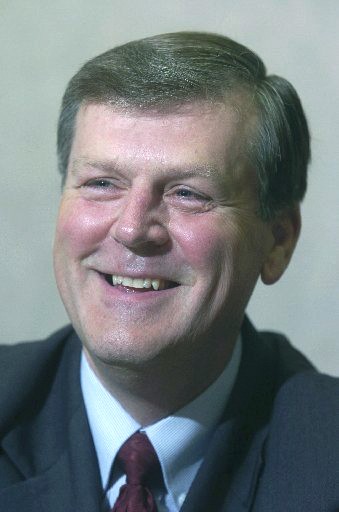Haas speaks to Michigan legislature

Courtesy Photo / mlive.com President Thomas Haas
Mar 3, 2011
Grand Valley State University President Thomas J. Haas drove to Lansing Wednesday to appeal to Gov. Rick Snyder and the Michigan legislature to decrease the proposed cuts to higher education in the state budget.
Snyder announced a budget proposal in February that would slash higher education spending by 22 percent, a move that has left students in panic as higher tuition fees loom. Haas’ visit to Lansing was an appeal to the representatives to restore funding to Michigan’s colleges and universities.
GVSU currently receives the least state funding per student at $3,775 a head – compared to a $5,502 per student average across the state – despite high enrollment and one of the lowest tuition rates in Michigan. Last summer, Haas testified to the House Higher Education Appropriations Committee that he would decrease student tuition by 5 percent if GVSU appropriations were raised to the floor funding level. His appeal was denied.
State Budget Director John Nixon said the education cuts are some of many necessary sacrifices being made by the state to get Michigan’s economy back on track.
“We’ve made tough decisions and I would call this a very responsible budget,” Nixon said in a press release. “I think it’s pretty clear that we are done kicking the can down the road, and I think a huge part of this story is that we are taking the first step to addressing Michigan’s burgeoning unfunded post-employment liabilities by putting aside $400 million in a special reserve fund.”
The university has made a number of cutbacks in recent years to prepare for the looming funding cuts from the state. Faculty and staff agreed to pay freezes and to finance a percentage of their health care costs to keep tuition increases minimal for students. Other actions have cut $7 million out of the university budget in each of the last two years.
In 2010 and 2009, tuition rates increased by 5.3 percent at GVSU, a rate below the state average.
Haas said in an e-mail to the student body that the university has been preparing for cutbacks and is financially stable.
“Our highest priority is to ensure that students remain able to enroll in the classes they need in order to graduate in a timely manner,” Haas said. “I will not allow reductions in state aid to compromise our academic quality nor our services to students.”

























